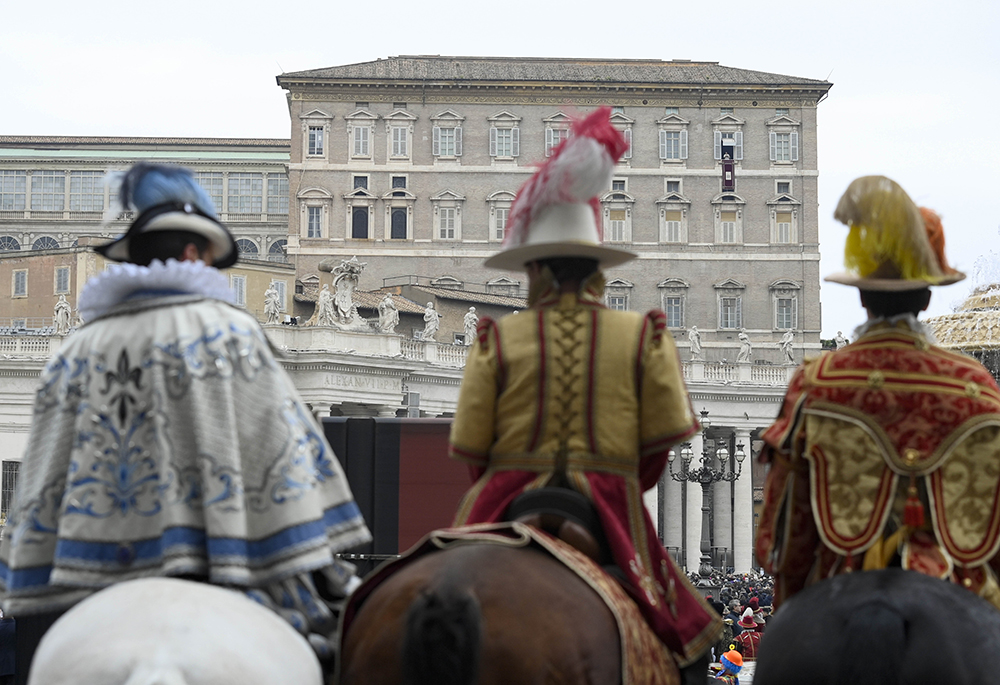
Participants in a parade for the feast of the Epiphany attend Pope Francis' recitation of the Angelus from the window of his studio overlooking St. Peter's Square Jan. 6, 2023, at the Vatican. (CNS/Vatican Media)
The Gospels tell us that, in response to various circumstances, Jesus rejoiced, wept, demonstrated anger and was impatient with his disciples. Of all the divine estimations of earthly situations, irony might be the one that most saddens or delights God. Clearly, tragedy is worse: Catastrophes, wars, plagues . . . God is intensely present to the sufferers in all those events, even though, like Jesus on the cross, they often cry out, feeling abandoned. But the ironic things, the things that happen in the opposite way from the expected, can be the source of profound disappointment or delight. Matthew's story of the Magi is full of irony.
Matthew structured his Gospel so that everything would illumine Jesus' last command and final promise. After telling the disciples to spread the Gospel throughout the whole world, he promised, "Behold, I am with you, until the end of the age."
Who knows from what sources Matthew drew his stories about Jesus' birth? Matthew wasn't about writing a history. When we study his stories, we realize that his narrative, although it's been embellished for centuries, is surprisingly sparse. Even so, Matthew wants us to perceive something important in the events he describes.
For Matthew, Joseph, a true son of Abraham, is the chief human actor in the events leading to Jesus' birth (the birth itself is mentioned only in passing). Matthew exhibits more interest in the star than in Mary and Jesus! The star, a symbol visible to the whole world, proclaimed that an extraordinary event had taken place — in obscurity. Who paid attention? Pagans, people who were not of the true faith of Israel. The Magi, practiced at their own kind of discernment, read the signs of the times and had enough humility and courageous curiosity to venture beyond their certainties.
Storytellers have led us to think we know the names of the people (Kings? Religious leaders? Intellectuals?) who visited Jesus in Bethlehem. In reality, the Magi could well have comprised a caravan of pilgrims who knew trade routes and studied the skies. (The number three refers to the gifts, not the travelers.) As diplomatic visitors, they presented themselves to the local people of rank, explaining their quest.
When the Magi asked for the newborn king, Herod turned to the religious leaders to ask what the prophecies said about where the Christ was to be born. Illustrating John's statement that "he came to his own and his own knew him not," the leaders demonstrated that they could decipher prophecy while remaining immune to its message. Thus, pagan pilgrims replaced the scribes and priests who could have led the way to Emmanuel.
What is Matthew telling us with these details? First, he's warning against religious certainty. Throughout the Gospels, Jesus' enemies are convinced that they have the whole truth and that Jesus is a heretic or worse. To God's grief, their certainty blinded them to the natural wonder of the star and the wisdom of their scriptures.
The Magi were seekers. They observed a sign and desired to understand what it meant. They displaced themselves, seeking something bigger than what they already knew. Although strangers to Israel, they acted more like Abraham than did his descendants who claimed to revere their wandering ancestor. The leaders exhibited no interest in following in Abraham's pilgrim footsteps toward a hope greater than anything he had known before. The Magi exemplified the poor in spirit, people open and inquisitive enough to discover a God bigger than their imagination — a God who would delight in their seeking and finding.
Advertisement
Matthew tells on the leaders in Jerusalem to warn us against allowing dogma to close the door on growth in faith. He portrays the wandering Magi as guides to Emmanuel, God with us. Matthew encourages us to cultivate the humility and openness necessary to discover something bigger, deeper, more mysterious than our best teachings or wildest imaginings.
Ironic isn't it? Pagans following a star were open to the manifestation of the God of Israel while religious leaders disregarded all the signs they had at hand.
Today's feast is called the Epiphany. "Epiphany" refers to a manifestation of God or an insight into the deep meaning of something. An epiphany is a happening, not an activity or decision. We may journey like the Magi seeking something, but epiphany is beyond our control. Epiphany happens to people willing to have their minds changed. Epiphany is an experience of grace; for those who will receive it, it is an experience of God with us until the end of the age.
For today's feast, in addition to singing "We Three Kings," we might imitate them and sing a humble mantra: "I wonder as I wander out under the sky." Ironically, wandering wonder is the recipe for being open to an epiphany.
